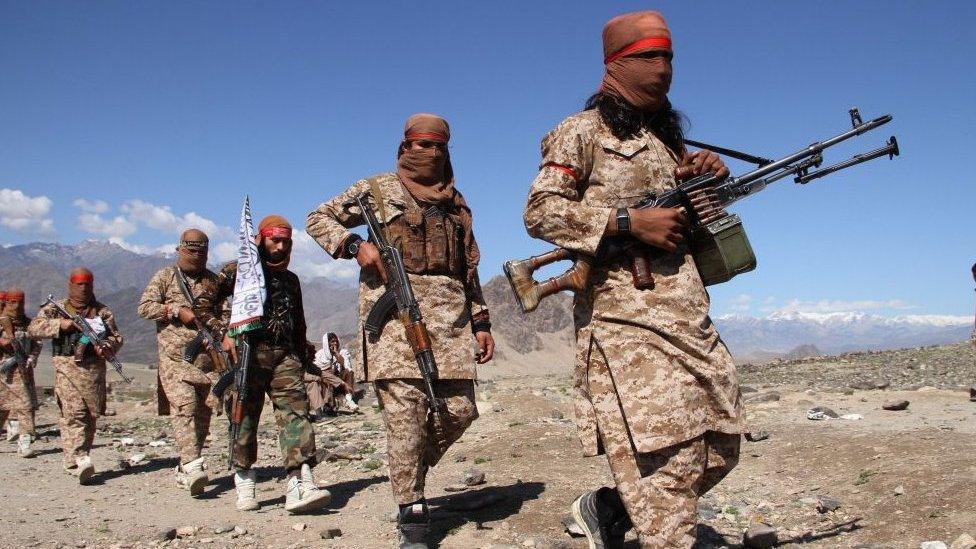Afghanistan: What's being done to help Afghan refugees?
- Published
- comments
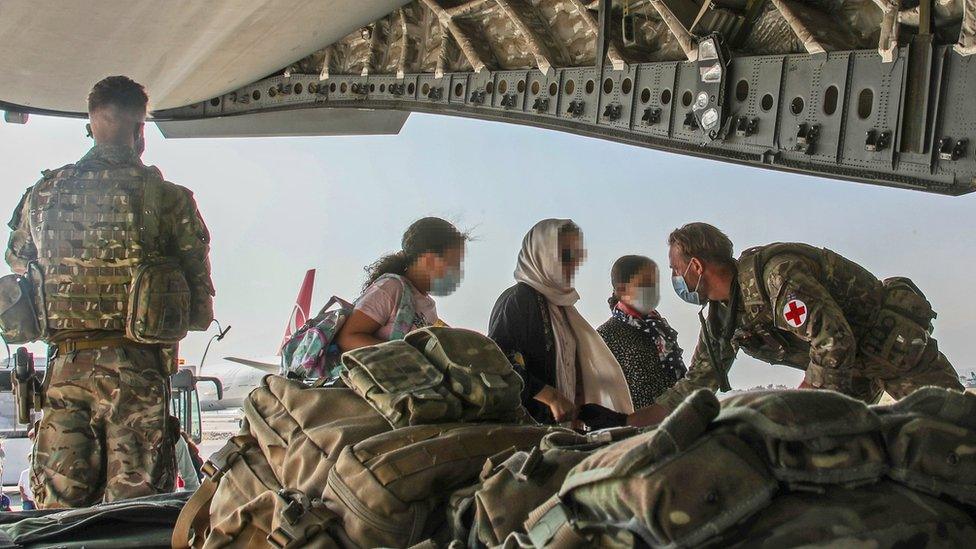
There will soon be around 900 UK troops in Kabul to assist with the evacuation of UK and Afghan nationals
The UK will introduce a new resettlement scheme for Afghan refugees, aimed at helping those most in need come to the UK.
It comes after UN Secretary-General António Guterres has asked the international community not to abandon the people of Afghanistan.
The new scheme would offer up to 20,000 Afghans a route to set up home in the UK over the next few years.
In the first year 5,000 refugees will be eligible, with women, girls and others in need having priority.
Refugee charities welcomed the announcement as a positive first step but said the timeframe was too slow and more people should be made eligible for asylum.
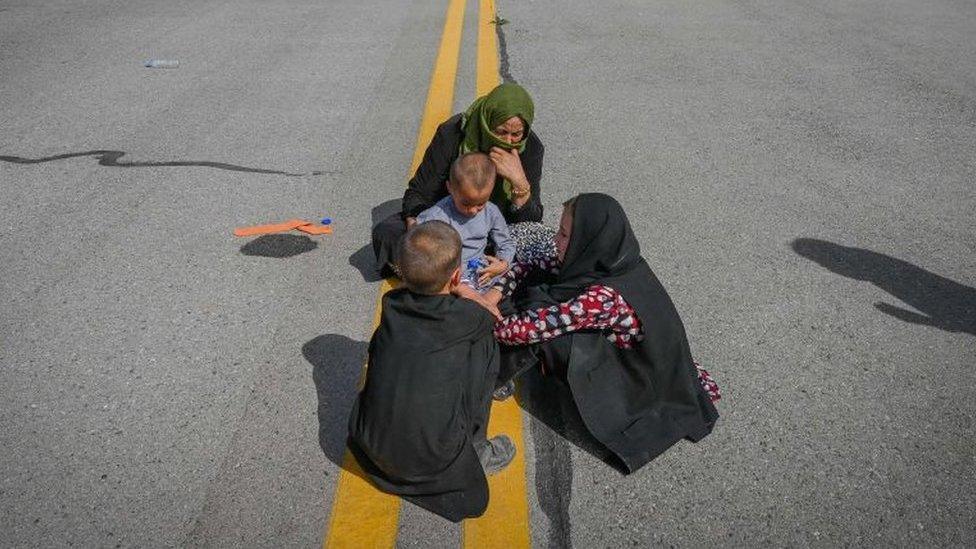
Afghan people sit along the tarmac as they wait to leave the Kabul airport
The steps come after the Taliban seized control of Afghanistan's capital city Kabul, prompting thousands to try to flee.
More than 60 countries have published a statement calling for the Taliban to allow foreign nationals and Afghans to leave, and keep border crossings, roads, and airports open.
Many Afghans had already fled to Kabul in recent weeks, as the Taliban advanced into other areas.
Help from the UK
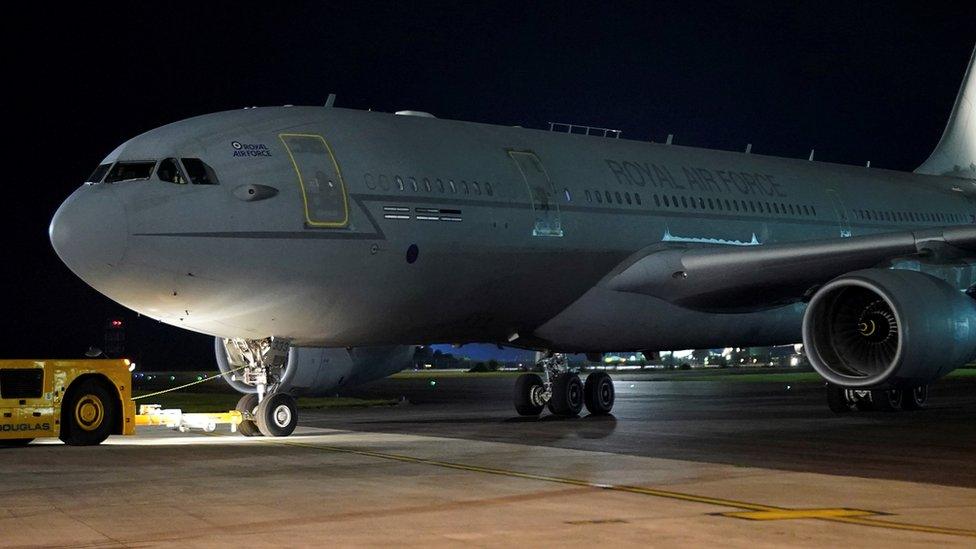
An RAF plane arrived at Brize Norton on Tuesday as part of UK efforts to evacuate people from Afghanistan
Speaking about this new Afghan Citizens' Resettlement Scheme, Prime Minister Boris Johnson said: "We owe a debt of gratitude to all those who have worked with us to make Afghanistan a better place over the last twenty years.
"Many of them, particularly women, are now in urgent need of our help. I am proud that the UK has been able to put in place this route to help them and their families live safely in the UK."
The new scheme offered by the UK government, for 20,000 refugees, is on top of an existing scheme for Afghan staff who worked for the UK. This includes Afghan nationals who have worked for the British government in frontline roles "that made a material difference to the delivery of the UK mission" in the country, such as interpreters and embassy staff.
The term refugee refers to people who have been forced to flee from their homes in order to keep safe from war, persecution or natural disaster.
About 5,000 staff and their families will come to the UK via that scheme this year. Nearly 2,000 have already arrived since 22 June.
Downing Street said Mr Johnson spoke to US President Joe Biden on Tuesday evening about the evacuation of Kabul.
The leaders "resolved to continue working closely together on this in the days and weeks ahead to allow as many people as possible to leave the country", a spokesperson said.
Criticism of the plans
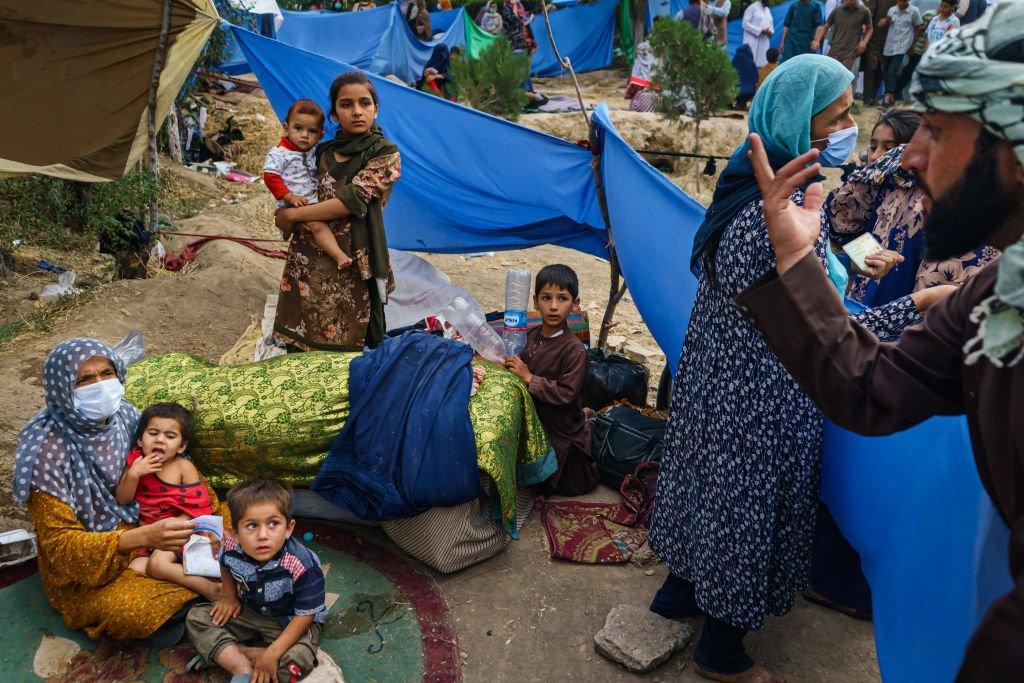
Many Afghans had already fled to Kabul in recent weeks, as the Taliban advanced into other areas.
However others have been critical of the announcements for not offering enough help.
Senior Labour politician Nick Thomas-Symonds welcomed the government putting a scheme in place but said there needed to be a "more urgent plan of action".
And Conservative Tobias Elwood, the chairman of the Defence Select Committee - a group of senior MPs who study the government's defence and security plans - said it was a "woefully inadequate response", that "does not meet the scale of the challenge".
And Ian Blackford, the SNP leader in Westminster, tweeted the scheme didn't "go anywhere near far or fast enough" and added the target should be at least 35,000 to 40,000 Afghan refugees.
What has the response been from other countries ?
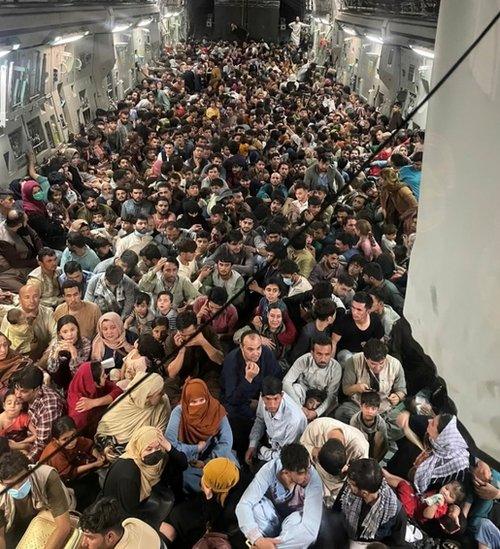
This image appears to show hundreds of people crammed into a US carrier in an attempt to escape Kabul
The UN refugee agency estimates that about 400,000 Afghans have been internally displaced due to fighting this year.
Last week it estimated that 80% of displaced people fleeing the Taliban in Afghanistan were women and girls.
UN Secretary-General António Guterres has asked the international community not to abandon the people of Afghanistan.
On social media, he urged "all countries to be willing to receive Afghan refugees and refrain from deportations.
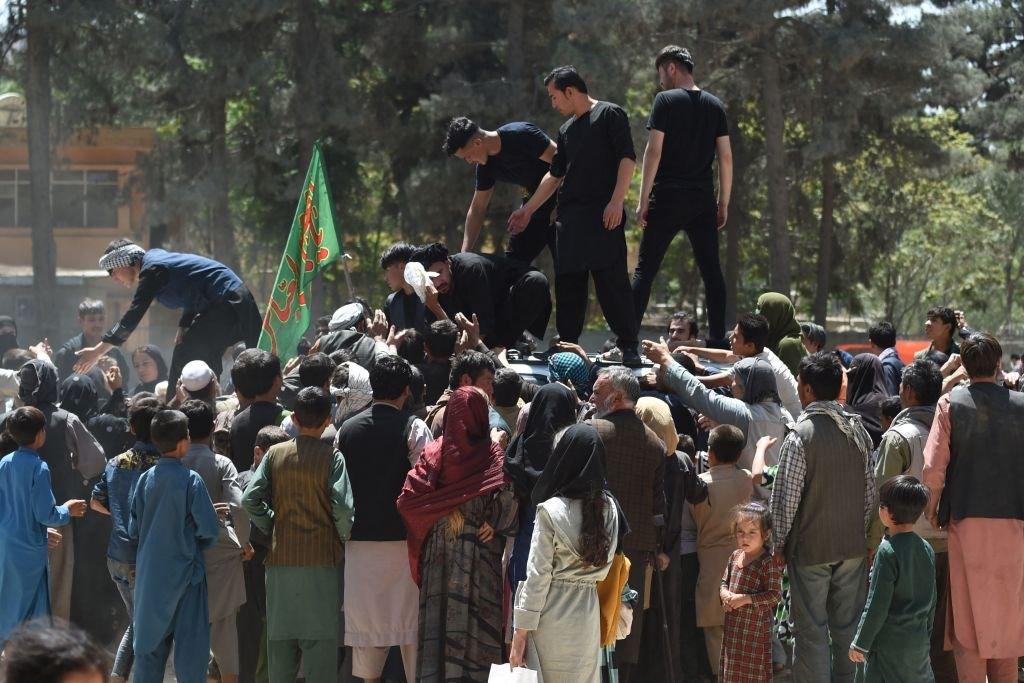
Food being handed out in Kabul at Shahr-e-Naw Park in Kabul earlier in August
Some countries have already said that they will accept refugees but only in limited numbers.
Canada has said it will take in 20,000 vulnerable people including women. A number of Nato member states have also said they will pause deportations and welcome in more refugees.
The US has already evacuated about 1,200 people with Special Immigrant Visas - given to interpreters and other helpers of US forces at risk - and has plans to evacuate about 3,500 more.
It has also announced plans to accept thousands more refugees, but they would have to apply from a third country, something that could be very difficult ask as the Taliban control all of Afghanistan's border points.
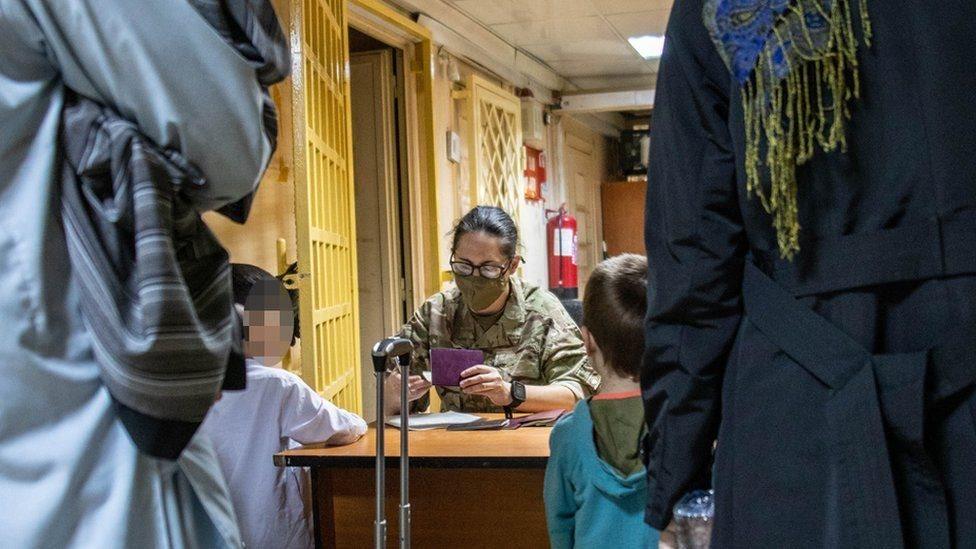
President Biden has also promised $500m in aid to Afghan refugees, from a US emergency refugee fund.
He said this would be used to meet "unexpected urgent refugee and migration needs of refugees, victims of conflict, and other persons at risk as a result of the situation in Afghanistan".
India has announced a new category of e-visas to fast track the applications of Afghans who want to go to India, but it is unclear how such Afghans would be able to apply for the visa or get to India.
- Published18 August 2021
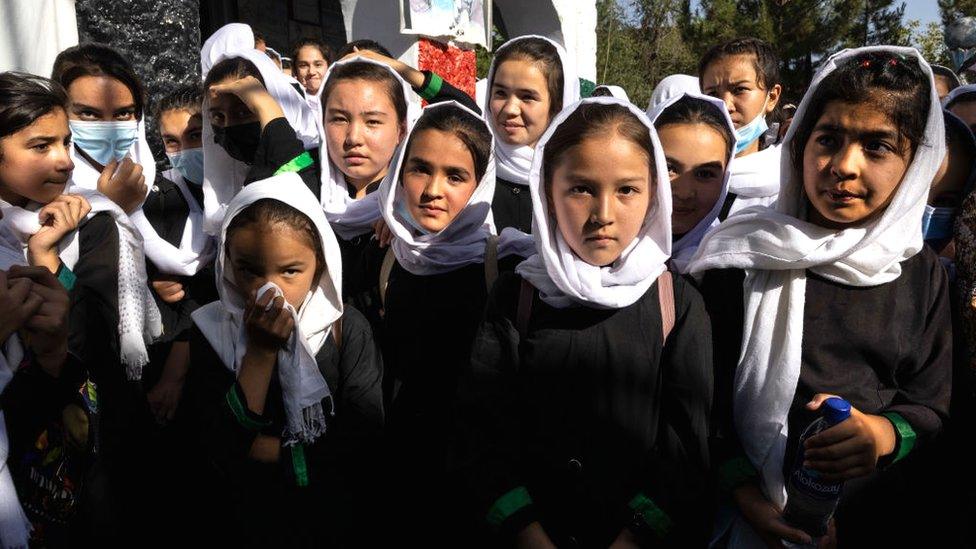
- Published17 August 2021
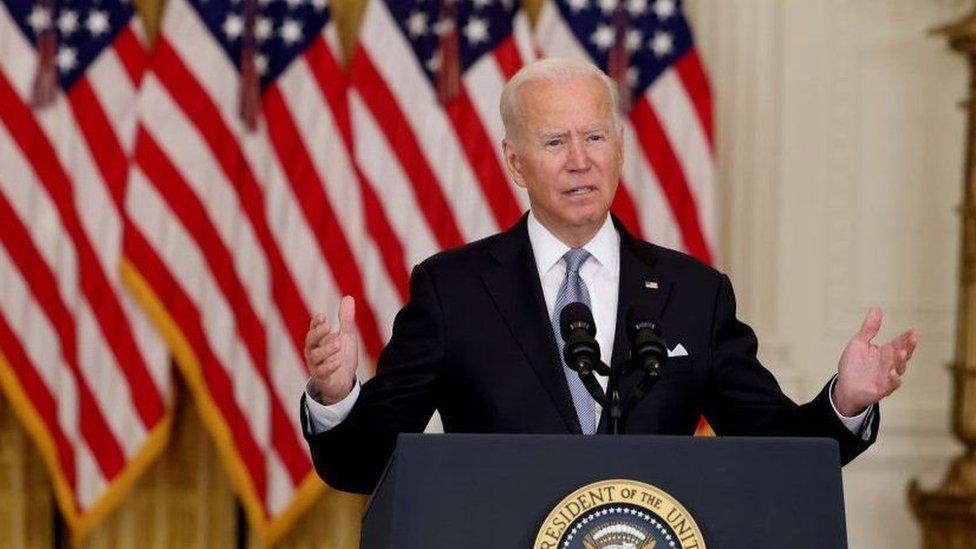
- Published17 August 2021
